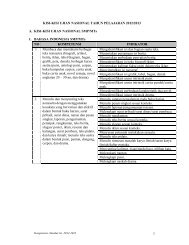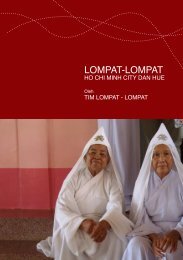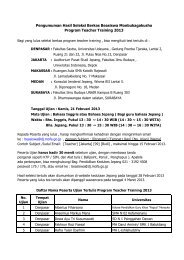9700_y16_sy
9700_y16_sy
9700_y16_sy
You also want an ePaper? Increase the reach of your titles
YUMPU automatically turns print PDFs into web optimized ePapers that Google loves.
Cambridge International AS and A Level Biology <strong>9700</strong> <strong>sy</strong>llabus Introduction<br />
Why Cambridge International AS and A Level Biology?<br />
Universities value learners who have a thorough understanding of key concepts in biology, an<br />
in-depth knowledge of biology’s most important themes and strong practical skills. Cambridge<br />
International AS and A Level Biology helps learners develop the knowledge and skills that will<br />
prepare them for successful university study.<br />
Our learners also develop lifelong skills of scientific enquiry, confidence in technology, and<br />
communication and teamwork skills.<br />
Key concepts<br />
The key concepts on which this <strong>sy</strong>llabus is built are set out below. These key concepts can help teachers<br />
think about how to approach each <strong>sy</strong>llabus topic in order to encourage learners to make links between<br />
topics and develop a deep overall understanding of the subject. The teaching support package gives<br />
teachers guidance on integrating the key concepts into their teaching. See page 8 for more information on<br />
our teacher support.<br />
As a teacher, you will refer to these concepts again and again to help unify the subject and make sense of<br />
it. If mastered, learners can use the concepts to solve problems or to understand unfamiliar subject-related<br />
material.<br />
• Cells as the units of life<br />
A cell is the basic unit of life and all organisms are composed of one or more cells. There are two<br />
fundamental types of cell: prokaryotic and eukaryotic.<br />
• Biochemical processes<br />
Cells are dynamic: biochemistry and molecular biology help to explain how and why cells function as<br />
they do.<br />
• DNA, the molecule of heredity<br />
Cells contain the molecule of heredity, DNA. Heredity is based on the inheritance of genes.<br />
• Natural selection<br />
Natural selection is the major mechanism to explain the theory of evolution.<br />
• Organisms in their environment<br />
All organisms interact with their biotic and abiotic environment.<br />
• Observation and experiment<br />
The different fields of biology are intertwined and cannot be studied in isolation: observation and<br />
enquiry, experimentation and fieldwork are fundamental to biology.<br />
Guided learning hours<br />
Guided learning hours give an indication of the amount of contact time teachers need to have with learners<br />
to deliver a particular course. Our <strong>sy</strong>llabuses are designed around 180 guided learning hours for Cambridge<br />
International AS Level, and around 360 guided learning hours for Cambridge International A Level.<br />
These figures are for guidance only. The number of hours needed to gain the qualification may vary<br />
depending on local practice and the learners’ previous experience of the subject.<br />
Prior learning<br />
We recommend that candidates who are beginning this course should have previously completed a<br />
Cambridge O Level or Cambridge IGCSE course, or the equivalent, in Biology or in Co-ordinated Science.<br />
Back to contents page<br />
www.cie.org.uk/alevel<br />
5





